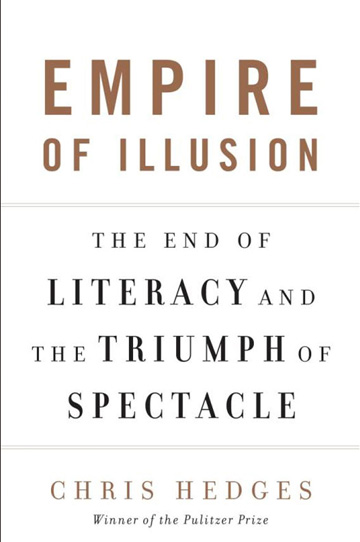In this short, grim, fiercely argued book, journalist Chris Hedges explains that we are doomed. He catalogues in essay-length chapters four examples of what he calls modern America’s “moral nihilism”: its fawning celebrity culture, sadistic pornography industry, insipidly vocational universities, and pervasive corporate influence. Hedges concludes with a wake-up call for a society that, he says, “has become the greatest illusion in a culture of illusions”:
In an age of images and entertainment, in an age of instant emotional gratification, we neither seek nor want honesty or reality. Reality is complicated. Reality is boring. We are incapable or unwilling to handle its confusion. We ask to be indulged and comforted by cliches, stereotypes, and inspirational messages that tell us we can be whoever we seek to be, that we live in the greatest country on earth, that we are endowed with superior moral and physical qualities, and that our future will always be glorious and prosperous.
As a leftist, Hedges would never resuscitate Robert Bork’s phrase “slouching towards Gomorrah,” but that is the general idea. Totalitarianism, Hedges argues, not only looms for a society distracted from its civic obligations by shallow entertainments and corporate inducements; it becomes inevitable. We are Weimar Germany, and you can practically hear the goose-stepping down at the plaza. It is unclear who, exactly, will be holding the riding crop — maybe Sarah Palin, maybe an overpaid CEO. In any event, Hedges believes that cultural backsliding like the Learning Channel’s decision to abandon documentaries about red blood cells and magma flows for the lurid Jon & Kate Plus 8 divorce melodrama is not just a matter of bad taste. The foundations of democracy itself are at stake.
If that is Empire of Illusion‘s breathless conclusion, its early reporting is more sober. Hedges is particularly good in the chapter on celebrity culture, describing the perversity of watching Martha Stewart tell women how to create the perfect home while “the realities within the home, the family relationships, are never addressed. Appearances make everything whole.” “Human beings,” he observes elsewhere, in a section on American Idol, “become a commodity in a celebrity culture. They are objects, like consumer products. They have no intrinsic value.” Hedges’s reporting on the pornography industry is also solid, even if its focus on extreme, violent subcurrents and its fondling of the details, in Nabokov’s phrase, make for a brutal reading experience.
But peppered throughout the book, and especially its later chapters, is an incendiary rhetoric that seriously inhibits the serious discourse to which Empire of Illusion aspires. Pornography, Hedges suggests, is the equivalent of torture at Abu Ghraib. Higher education, which Hedges says has abandoned the humanities for job training, is a “soul-crushing experience.” Positive psychology, the latest get-happy-quick fad, “is to the corporate state what eugenics was to the Nazis.” Business leaders are “mediocrities who mask their feelings of worthlessness and emptiness behind the facade of power and illusion,” and Hedges fairly pines for the days when those who speculated with others’ money were hanged rather than paid big bonuses.
This overheated language is far too shrill — citations to Auden and Hazlitt notwithstanding. If Hedges would only pause before reloading, he could explore the nuances of these issues and resolve some of the inconsistencies in his own arguments. For instance, he is quite right to point out that a journalism industry increasingly focused on celebrity and inside access leads reporters to forgo tough questions in order to preserve relationships. But then he lobs this softball while interviewing a professor who shares his political sympathies: “Could widespread frustration and poverty lead the working and middle classes to place their faith in demagogues, especially those from the Christian Right?” He rightly notes that buffoons like CNBC’s Jim Cramer mislead viewers and cheapen political debate by calling Democrats members of the Politburo. But Hedges also favorably quotes Marx and Lenin, predicts the collapse of capitalism, champions workers, sneers at the bourgeoisie as pastry-holding conference-goers, and lashes out harshly at “elites.” He decries the cult of victimhood while blaming most everything on corporations.
For a book exhorting social and political change, Empire of Illusion is also frustratingly thin on pragmatics. Hedges lauds crusaders like Ralph Nader and Dennis Kucinich — men whose fidelity to principles is admirable, but whose resistance to the compromises that make the world work gave us, respectively, George W. Bush’s first four years and the most laughably hopeless presidential run since Alan Keyes’s last campaign. Similarly, while Hedges is right that lobbying and corporate influence interfere far too much in the public’s business, he might have examined a thorny cause of this state of affairs: the Supreme Court’s conclusion 33 years ago that political spending is a type of expression that deserves constitutional protection. The court may well have struck the wrong balance between robust free speech principles and political realities. But that is an argument to have on the merits, and hardly a reason for despairing at the sorry state of our democracy.
If Empire of Illusion is broadly correct about our pernicious obsession with spectacle and our disdain for the literary, Hedges ultimately missteps in tying these problems to politics. He argues that elites have distracted the masses with slick entertainments, the better to chip away at their rights and democratic institutions. Many politicians are indeed demagogues, and corporations undoubtedly do their best to push individuals into making certain choices — but in the end they are our choices. The hard truth that Hedges’s reporting uncovers is not that nefarious conspirators have tricked us into watching trash, buying smut, and studying finance instead of literature, but that at bottom these are our preferences. After all, the people vote with their television remotes as well as their dimpled chads. The solution, if there is one, is not to take to the streets but to pick up a book.







